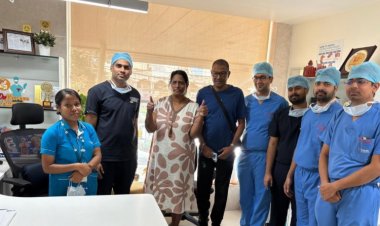World Diabetes Day 2025: Diabetes Across Life Stages

In India, diabetes has become a growing public health challenge, and for many, it goes unnoticed until serious complications arise. According to the ICMR-INDIAB study, over 101 million Indians currently live with diabetes, while another 136 million are pre-diabetic, meaning they are at high risk of developing the condition soon. The International Diabetes Federation (IDF) reports that 10.5% of Indian adults have diabetes, roughly 90 million people. These numbers have surged from 32 million in 2000 to 101 million today, largely due to modern lifestyle changes, including high consumption of processed foods, sugary drinks, and physical inactivity.
As the world marks World Diabetes Day 2025 on November 14, it serves as a reminder that prevention, timely diagnosis, and awareness are our best tools against this silent epidemic. Dr. Nithya Chandra, Senior Consultant General Medicine of Mallareddy Narayana Multispeciality Hospital, gives an insight into the growing impact of diabetes in India and how awareness and early management can help control its spread.
Understanding World Diabetes Day 2025
World Diabetes Day was first introduced in 1991 by the International Diabetes Federation (IDF) and the World Health Organization (WHO) in response to the rising global concern over diabetes. It became an official United Nations health day in 2006, symbolising the global effort to raise awareness and promote prevention.
The theme for 2025, “Diabetes Across Life Stages,” focuses on how diabetes affects individuals differently at every age, from childhood to old age, and highlights the need for age-specific prevention, care, and management strategies.
What Is Diabetes and Why Does It Matter?
Diabetes mellitus, or simply diabetes, is a chronic condition where the body either doesn’t produce enough insulin or cannot effectively use it. Insulin, made by the pancreas, helps regulate blood sugar levels. When this process fails, glucose builds up in the bloodstream, leading to complications that can affect the heart, kidneys, nerves, eyes, and blood vessels.
The three main types of diabetes are:
● Type 1 Diabetes: An autoimmune condition where the body destroys insulin-producing cells. It often appears in childhood or adolescence, requiring lifelong insulin therapy and careful monitoring.
● Type 2 Diabetes: The most common type, caused by insulin resistance and lifestyle factors such as poor diet, obesity, and inactivity. It usually develops in adulthood but is increasingly seen in younger populations due to sedentary habits.
●Gestational Diabetes: Occurs during pregnancy and increases future risk for both mother and child. Early screening and diet management are essential during this stage.
Prediabetes serves as a critical turning point at any age, a stage where timely intervention can prevent or delay full-blown diabetes.
Diabetes Across the Ages
In children and adolescents, Type 1 diabetes demands continuous insulin support, emotional counselling, and family education to ensure proper growth and daily management.
In young adults, especially those balancing studies or careers, Type 2 diabetes risk rises due to stress, irregular meals, and lack of physical activity. Building awareness about nutrition and active living is key at this stage.

Dr. Nithya Chandra, Senior Consultant General Medicine of Mallareddy Narayana Multispeciality Hospital
For middle-aged adults, the focus shifts to controlling weight, maintaining blood pressure, and preventing complications that often emerge after years of unnoticed high blood sugar.
In older adults, diabetes management becomes more complex due to coexisting conditions like heart disease, kidney problems, or neuropathy. Personalized treatment and regular monitoring become essential to prevent disability and ensure quality of life.
Over time, diabetes can lead to serious damage to many of the body's systems, especially the nerves and blood vessels, causing blindness, kidney failure, heart attacks, stroke, and lower-limb amputation, making early and lifelong management vital.
Recognising and Managing Diabetes
Common warning signs include excessive thirst, frequent urination, unexplained weight loss, fatigue, and blurred vision. Diabetes can be diagnosed through simple blood tests such as fasting glucose, HbA1c, or oral glucose tolerance tests.
While diabetes cannot be cured, it can be effectively managed through lifestyle changes; regular exercise, a balanced diet, maintaining a healthy weight, and taking prescribed medication when needed. The approach may differ with age, but the goal remains the same: keeping blood sugar levels stable and preventing complications.
Early intervention not only improves quality of life but also prevents long-term damage to vital organs.
Conclusion
World Diabetes Day 2025 reminds us that diabetes care is not one-size-fits-all; every life stage needs awareness, education, and tailored care. As India continues to witness a rapid rise in diabetes, awareness and preventive care are more important than ever. Small lifestyle changes like mindful eating, regular check-ups, and physical activity can make a lasting difference.
At Mallareddy Narayana Multispeciality Hospital, our expert endocrinologists provide comprehensive screening, personalisedtreatment, and counselling across all age groups to help patients manage diabetes effectively.
If you or your loved one’s experience symptoms or have a family history of diabetes, don’t delay; book your appointment at Mallareddy Narayana Multispeciality Hospital today and take the first step towards a healthier, balanced life.

 Disclaimer: Welthi.com does not guarantee any specific results as a result of the procedures mentioned here, and the results may vary from person to person.
Disclaimer: Welthi.com does not guarantee any specific results as a result of the procedures mentioned here, and the results may vary from person to person.









